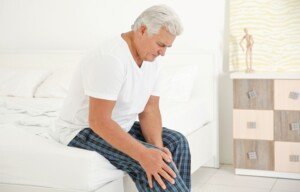
There are several conditions that can cause your knee to hurt only when lying down, and especially overnight after you’ve been in bed for several hours.
It seems odd that a knee would hurt mostly or even only when a person lies down.
After all, the human knee is subject to loads of pressure just from walking. We take that for granted.
The knee is actually the most unstable joint in the body. This is why self-defense classes teach students to “go for the knee” with any number of foot strikes.
A good strike by a 100 pound person to this inherently unstable joint can bring down a 300 pound brute.
If your knee hurts only when you lie down, or, chronic day pain gets notably worse overnight, there can be several reasons.
“Depending on the position of the knee, some inflammatory conditions such as tendinitis or bursitis may be worse when lying down,” says John-Paul H. Rue, MD, orthopedic sports medicine surgeon with Orthopedics and Joint Replacement at Mercy Medical Center in Baltimore, MD.
“Pain from osteoarthritis and rheumatoid arthritis may also worsen at night lying down as the muscles around the knee relax,” continues Dr. Rue.
“Other less common conditions such as ankylosing spondylitis may cause knee pain at night.”
Ankylosing spondylitis is a form of arthritis that primarily affects the spine, but can also affect other joints.
If you have this you probably already have back pain and stiffness.
“In general, placing the knee in a position with the support of additional pillows may lessen the pain associated with these conditions,” says Dr. Rue.
Experiment which positioning and pillow configuration works best for you.
Chances are pretty high that the best position will involve your knee bent at at least a 150 degree angle (a little more than midway between a straight leg and a leg bent at 90 degrees).
“Additionally, altering the medication timing for NSAIDS or other arthritis medications may help you get through the night,” says Dr. Rue.
“If you always find yourself waking up in the middle of the night with pain, modifying the time that you take your evening dose of medication may help extend the time of pain relief through the night.”
 Dr. Rue specializes in prevention and treatment of sports and exercise injuries. His primary focuses are knee, shoulder and elbow injuries including ACL and cartilage injuries, rotator cuff injuries and overuse tendonitis.
Dr. Rue specializes in prevention and treatment of sports and exercise injuries. His primary focuses are knee, shoulder and elbow injuries including ACL and cartilage injuries, rotator cuff injuries and overuse tendonitis.
 Lorra Garrick has been covering medical, fitness and cybersecurity topics for many years, having written thousands of articles for print magazines and websites, including as a ghostwriter. She’s also a former ACE-certified personal trainer.
Lorra Garrick has been covering medical, fitness and cybersecurity topics for many years, having written thousands of articles for print magazines and websites, including as a ghostwriter. She’s also a former ACE-certified personal trainer.


































